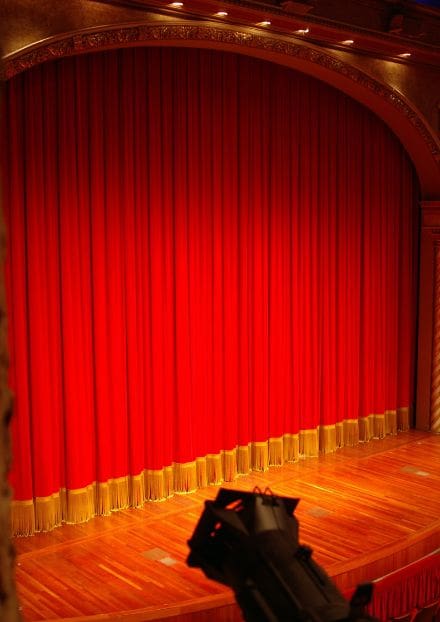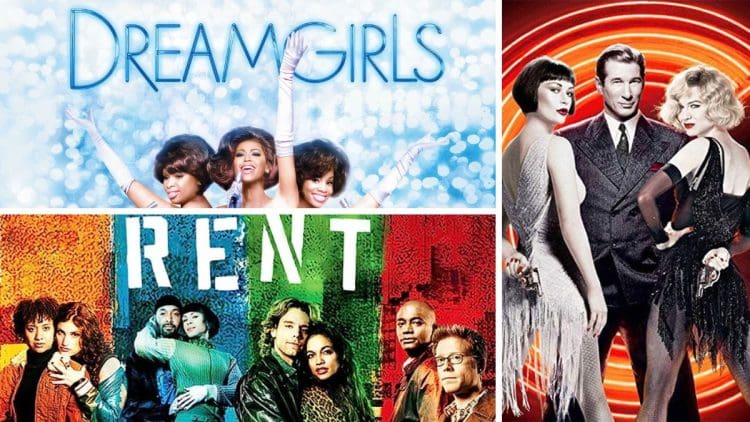From the pages of a script to the big stage, and sometimes even the big screen – musicals have a long history in entertainment. The idea of a musical as a production dates back to ancient Greece, where live performances were conducted in great stone amphitheaters which are architecturally sound for amplifying music and voice. Then, before there was television, there was live theater as we know it today.
And you might have guessed that when television did become commercially available, live performances were often broadcasted which acted as a stepping stone for bringing musicals to the screen instead of the stage or as the next step post-stage production.
Some theater fanatics will tell you that musicals just don’t belong on the big screen because it takes away the sensation of the theater. According to the Los Angeles Times, theaters took a hit economically with the COVID-19 pandemic (as most businesses did) and while they are back, attendance is down and operational costs are eating them away.
The theater has been dying for a long time, and it is those who love it that keep it alive, but do screen adaptions act as the catalyst for taking down the theater industry or help them thrive? Do spectacular productions with live performances get the justice they deserve in screen adaptations?
The bigger question at hand is, do musicals work on the big screen?
When They Are Well Done, Yes
Even though it might cross some nostalgic boundaries for theater lovers, when a musical is well down it absolutely has a place on screens. Part of the charade of going to the theater is enjoying the magic of the production – and sometimes movies have more of a budget for that magical moment than many theaters across the world
That isn’t to decertify going to the theater, it is just a point in favor of musicals on the screen. Look at Mamma Mia!, The beauty of a Greek island just can’t be captured the same way on a stage as it can be on screen. Another recent example is La La Land. While it has not actually made it to the stage yet and instead went directly to film production, it brings the magic of theater to film because it combines both productions that can take place on a stage as well as landscapes that just don’t translate live.

On the contrary, it might just depend on what kind of media you like to consume. Some people may find Les Miserable to be an incredibly engaging film because the songs are telling a story, while others might prefer traditional prose to verse to keep the storyline straight.
For those who love theater, screen adaptions are a pipeline to accessibility.
Screen-Adaptations Create Accessibility
Every big city is bound to have affordable local theaters to enjoy life musicals and plays, but not everyone can afford to go to Broadway or the equivalent of, not simply for the cost of entry but physically getting there.
Where musicals that get screen adaptations can be streamed from your home, making the magic of theater accessible to those who stream. What is being granted here is access to storylines and culture, but at a cost which is the musical embodies the magic of movies and not the same magic of theatre.
The magic changes when the modality does, and one could argue it is similar to enjoying the book more than the film – one will always be better or possibly stand out for something completely different from its counterpart.
Follows Content Consumption Trends
Other than accessibility, there are definite trends in media regarding storytelling. Look at Hello, Sunshine Productions by Reese Witherspoon. She has a franchise of media that is focused on bringing forward women’s stories, from the books that she chooses for Reese’s Book Club to buying the screen rights and creating adaptations.
This modal of media is as old as time, but trending today in terms of quick turnaround. The moment that a book goes viral on TikTok bidding wars begin over the film rights. In a way, musicals are a logical next step for big enterprise story-telling and in the past, they have been quickly successful such as Wicked, Phantom of The Opera, and Les Miserables.
Sometimes The Casting Is Off

By far one of the greatest letdowns historically with musicals is the casting. Often a big movie star is cast in a part that would be for a vocalist and dancer. Musicals are focused on music and dancing whereas movies rely heavily on acting – which causes a disruption in film adaptations (not everyone can be Meryl Streep or Amanda Seyfriend).
One of the biggest letdowns in big-screen adaptations was Eddie Redmayne being cast as Marius in Les Miserables compared to his co-stars who were literally Broadway stars. Not to create pity for the Jonas Brothers but Nick Jonas was also up for the role and has been involved with Les Mies since his childhood.
Another modern example, while La La Land was a big hit and Ryan Gosling does have a history of dabbling in music (see the Barbie movie for this original song), Emma Stone’s character struggles to keep up musically, even though she takes home the Oscar in the best-actress category.
There is a long history of snubbing singers and dancers, dating back to silent film actors who were out of jobs when “talkies” became the norm.
It Keeps Theater Alive
Whether you support musicals on the screen or not, you have to admit that a screen adaptation does resonate more with younger generations and helps keep the spirit of musicals alive.

It is a slippery slope to keep theater alive while also keeping it relevant. In some recent years, musicals have skipped the stage completely and gone straight to streaming, such as Ryan Murphy’s The Prom (although it had a limited-release Broadway debut).
Something to look forward to soon is the screen adaptation of Wicked, starring Ariana Grand and Cynthia Ervio, which will be telling as to whether musicals really do work on the screen or not – when finding actors that fit the requirements.
Here’s to musicals lighting up the screens, stages, and everything in between!













